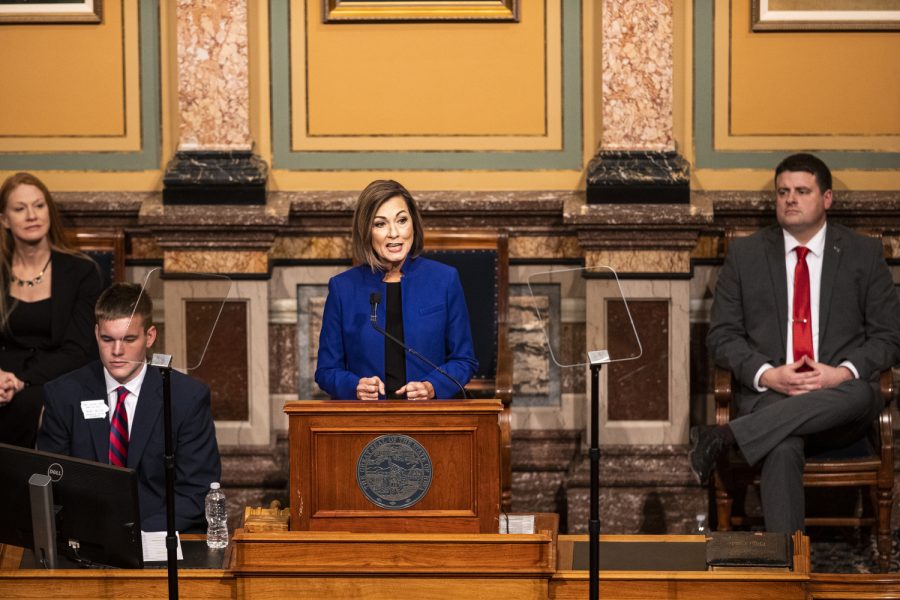Parental rights and the culture war drive conservative politics in Iowa and across the nation
The Iowa legislature is moving forward with Gov. Kim Reynolds’ parental rights’ omnibus bill that would prevent instruction on gender and sexuality in elementary schools.
Gov. Kim Reynolds delivers her 2023 Condition of the State speech at the Iowa State Capitol in Des Moines on Jan. 10, 2023.
March 26, 2023
Parental rights is the new trend in Republican politics this year, with dozens of statehouses across the country considering legislation targeting parents’ control over classroom topics, sex education, library books, and the parent’s right to know if their child is transgender.
Iowa may soon join the ranks. In the U.S., 25 other Republican-controlled states have passed legislation restricting what children can learn at school, according to The Washington Post.
The Iowa Senate passed Senate File 496, 34-16, along party lines on March 22. The omnibus K-12 education reform package came from Gov. Kim Reynolds’ desk and now heads to the House for consideration.
The bill, which was proposed by Reynolds as one of her main priorities for the legislative session, was broken down into smaller bills in the Iowa House. Many of the same provisions have previously passed in the House.
Among many reforms to K-12 education in the Senate, some provisions aim to limit education on LGBTQ+ topics:
- Prohibiting classroom instruction on sexuality and gender identity for students in kindergarten through sixth grade.
- Prohibiting school employees from using pronouns or a name that does not align with a student’s birth certificate without written consent from the parent.
- Requiring schools to post a list of all books available to students, curriculum, instructional materials, and policies on challenging books.
- Requiring schools to inform parents if they believe their child is expressing a different gender identity than listed on their birth certificate, unless the school fears for the student’s safety.
- Requiring school libraries to contain “age-appropriate” books, which the bill defines as books that do not include a description or visual depiction of a sex act.
Steffen Schmidt, Iowa State University political science professor, said parental rights bills are part of a broad agenda to reduce the government’s role in making decisions on a child’s education and to prevent a wide range of LGBTQ+ programs.
“These rights have become central to the conservatives and especially Republicans,” Schmidt wrote in an email to The Daily Iowan. “These rights are very popular among a sizable chunk of voters. In Iowa, Florida, and most Republican states, the issue has been top on the legislative agenda.”
However, a March Des Moines Register Iowa poll found that two out of three Iowans believe that their public schools align with their family values. The same Iowa poll found that Democrats are more likely to say public schools align with their family values.
Sen. Ken Rozenboom, a Republican from Oskaloosa, managed the bill during debate on March 22 and argued that teaching elementary students about gender identity and sexual identity is inappropriate.
Critics of the bill argue that its vague language could prevent LGBTQ+ educators from discussing their own identities or families, or that when posed a question about such topics, they would be unable to answer.
“Instruction on gender identity and sexual orientation, in my view, is totally unnecessary for elementary students,” Rozenboom said. “Parents and guardians that wish to have that conversation with their child can do so in the home or any other setting they would like, but to have that in the public school, most of us — many of us — believe is inappropriate.”
Sen. Herman Quirmbach, a Democrat from Ames, argued Republicans like Rozenboom are trying to legislate non-issues. He said no one is going to be teaching how to perform sexual acts to first graders. This legislation prevents teachers from educating children about the diverse identities in the population, Quirmbach said.
“This legislature has been driving wedges of doubt and dissension between parents and public schools for the last several years,” Quirmbach said. “We’ve got to quit doing that. We’ve got to create an environment where parents and teachers can work together in the interests of the child.”
Not only have state legislatures been acting on this GOP priority, but so has the U.S. Congress.
U.S. Rep. Ashley Hinson, R-Iowa, was one of many champions of the 2022 U.S. House of Representatives’ Parents Bill of Rights. Hinson, who lives in Marion and represents northeast Iowa, campaigned on the issue and won reelection in November 2022.
Hinson’s campaign focused on the controversy surrounding gender-affirming policies put in place in the Linn-Mar Community School District, which House Resolution 5 and the governor’s parental rights in education bill both prohibit.
The U.S. House passed House Resolution 5, or the Parents Bill of Rights Act, 213-208, on party lines, on Friday.
“As the mom of two boys, I couldn’t be prouder that we passed the Parents Bill of Rights and reaffirmed that parents — not school boards, and not the government — are the primary stakeholders in their children’s education,” Hinson said in a news release on Friday. “When you have school boards, like Linn-Mar, instituting radical policies that allow children to change their gender identity at school without parental notification or consent, you’re going to see mama bears like me take action. Parents will not be sidelined as woke school boards try to box us out of decisions that impact our children’s well-being.”




